外研版 必修四 Module 1 Life in the Future Grammar—将来进行时课件(38张PPT)
文档属性
| 名称 | 外研版 必修四 Module 1 Life in the Future Grammar—将来进行时课件(38张PPT) | 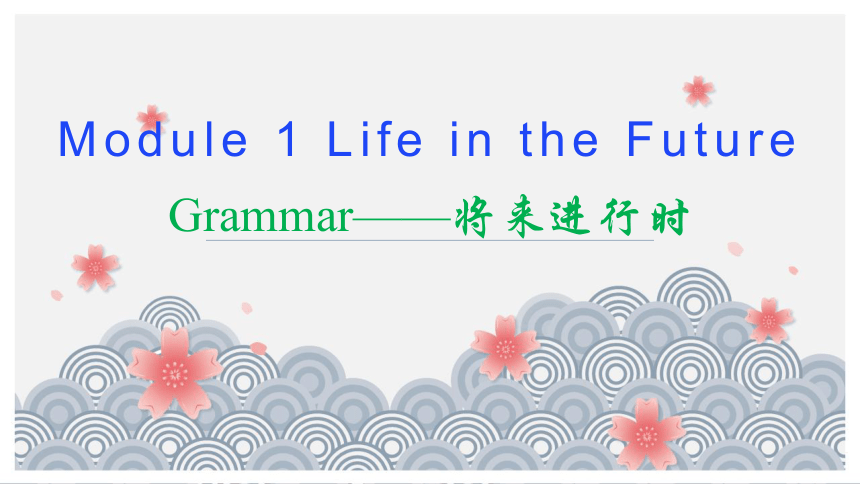 | |
| 格式 | pptx | ||
| 文件大小 | 21.8MB | ||
| 资源类型 | 教案 | ||
| 版本资源 | 外研版 | ||
| 科目 | 英语 | ||
| 更新时间 | 2023-01-28 19:07:42 | ||
图片预览



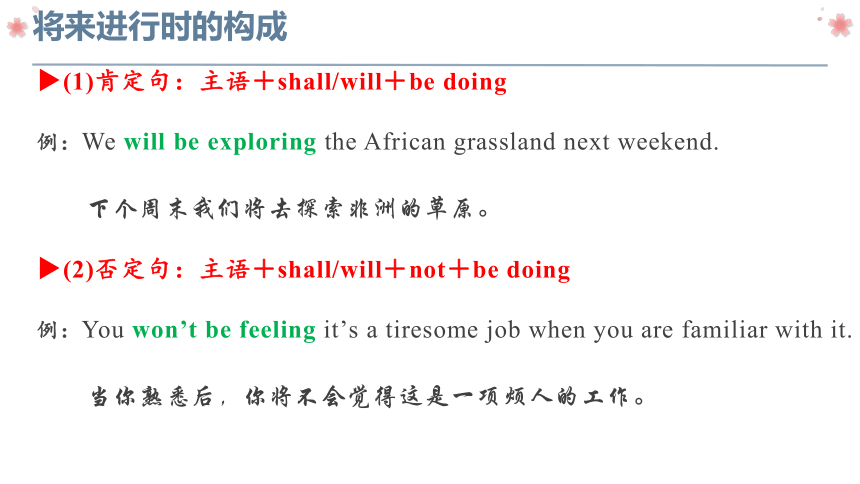
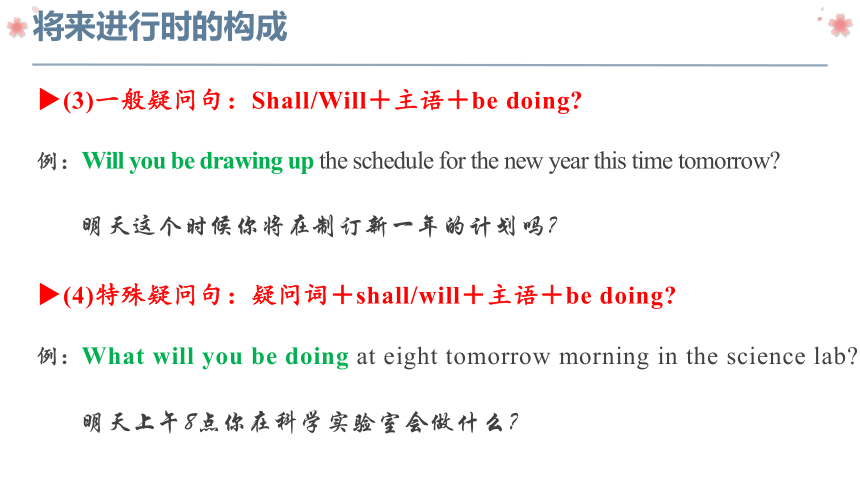

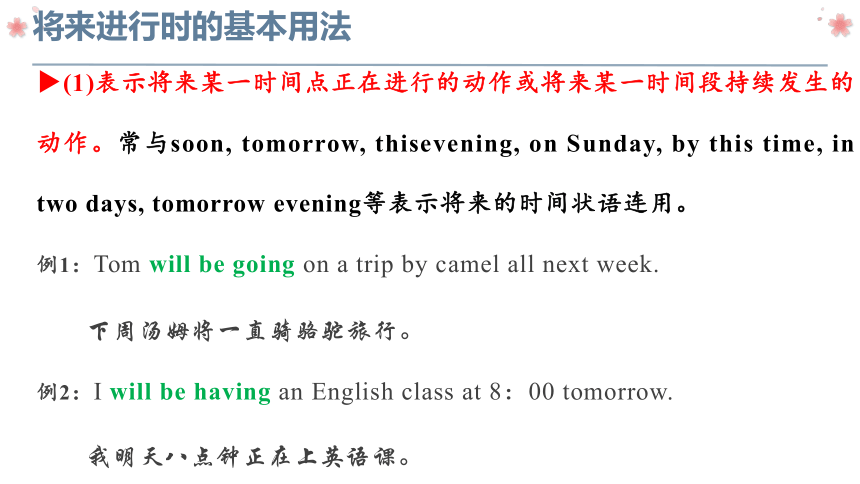
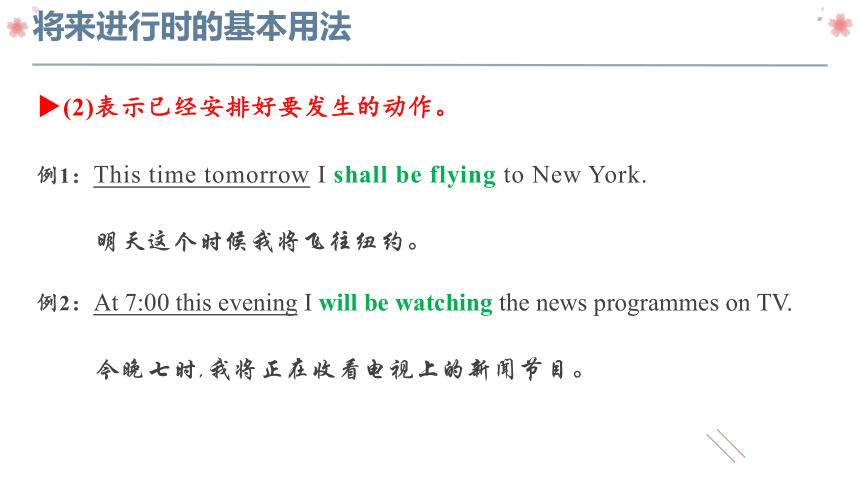
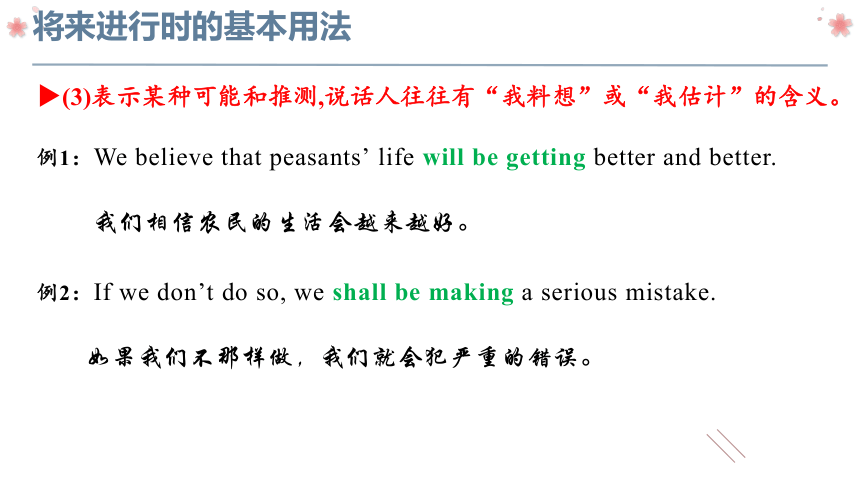
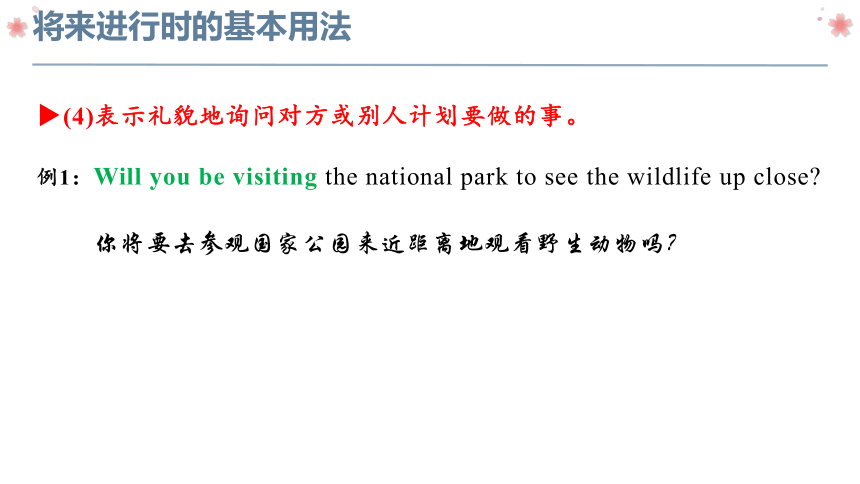

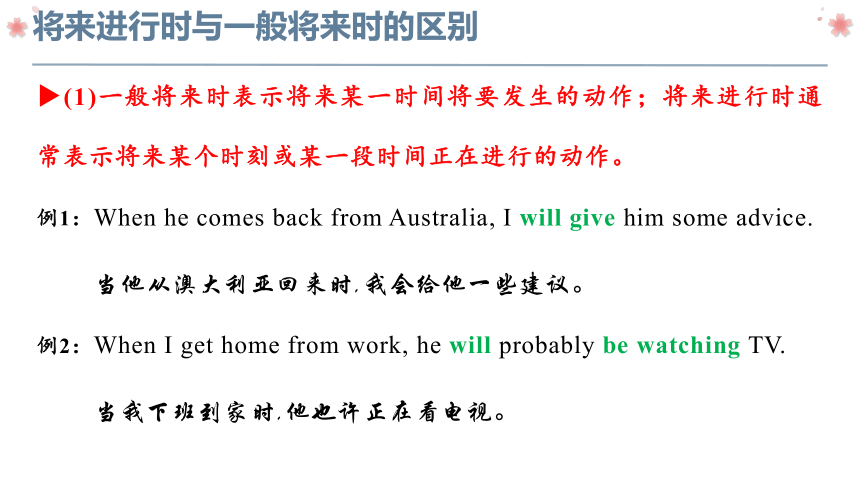
文档简介
(共38张PPT)
Module 1 Life in the Future
Grammar——将来进行时
目录
将来进行时的构成
01
02
将来进行时的基本用法
03
将来进行时与一般将来时的区别
04
现在进行时表将来进行时
05
练习
01
将来进行时的构成
将来进行时的构成
(1)肯定句:主语+shall/will+be doing
例:We will be exploring the African grassland next weekend.
下个周末我们将去探索非洲的草原。
(2)否定句:主语+shall/will+not+be doing
例:You won’t be feeling it’s a tiresome job when you are familiar with it.
当你熟悉后,你将不会觉得这是一项烦人的工作。
将来进行时的构成
(3)一般疑问句:Shall/Will+主语+be doing
例:Will you be drawing up the schedule for the new year this time tomorrow
明天这个时候你将在制订新一年的计划吗?
(4)特殊疑问句:疑问词+shall/will+主语+be doing
例:What will you be doing at eight tomorrow morning in the science lab
明天上午8点你在科学实验室会做什么?
02
将来进行时的基本用法
将来进行时的基本用法
(1)表示将来某一时间点正在进行的动作或将来某一时间段持续发生的动作。常与soon, tomorrow, thisevening, on Sunday, by this time, in two days, tomorrow evening等表示将来的时间状语连用。
例1:Tom will be going on a trip by camel all next week.
下周汤姆将一直骑骆驼旅行。
例2:I will be having an English class at 8:00 tomorrow.
我明天八点钟正在上英语课。
将来进行时的基本用法
(2)表示已经安排好要发生的动作。
例1:This time tomorrow I shall be flying to New York.
明天这个时候我将飞往纽约。
例2:At 7:00 this evening I will be watching the news programmes on TV.
今晚七时,我将正在收看电视上的新闻节目。
将来进行时的基本用法
(3)表示某种可能和推测,说话人往往有“我料想”或“我估计”的含义。
例1:We believe that peasants’ life will be getting better and better.
我们相信农民的生活会越来越好。
例2:If we don’t do so, we shall be making a serious mistake.
如果我们不那样做,我们就会犯严重的错误。
将来进行时的基本用法
(4)表示礼貌地询问对方或别人计划要做的事。
例1:Will you be visiting the national park to see the wildlife up close
你将要去参观国家公园来近距离地观看野生动物吗?
03
将来进行时与一般将来时的区别
将来进行时与一般将来时的区别
(1)一般将来时表示将来某一时间将要发生的动作;将来进行时通常表示将来某个时刻或某一段时间正在进行的动作。
例1:When he comes back from Australia, I will give him some advice.
当他从澳大利亚回来时,我会给他一些建议。
例2:When I get home from work, he will probably be watching TV.
当我下班到家时,他也许正在看电视。
将来进行时与一般将来时的区别
(2)两者均可表示将来,但用将来进行时语气更委婉。
例1:When will you pay back the loan from the bank three years ago
你什么时候还三年前从银行借的贷款?(似乎在直接讨债)
例2:When will you be paying the loan from the bank three years ago
三年前从银行借的贷款你什么时候还呢?(语气委婉)
将来进行时与一般将来时的区别
(3)有时一般将来时中的will含有“愿意”的意思,而用将来进行时则只是单纯地谈未来情况。
例1:Mary won’t pay this bill.
玛丽不肯付这笔钱。(表意愿)
例2:Mary won’t be paying this bill.
不会由玛丽来付钱。(单纯谈未来情况)
将来进行时与一般将来时的区别
将来进行时 一般将来时
将来某时正在进行的动作 将来某时将要发生的动作
已有的安排 临时的决定
语气更委婉
单纯地谈未来情况 will含有“愿意”的意思
04
现在进行时表将来进行时
现在进行时表将来进行时
在时间、条件等状语从句中,用现在进行时代替将来进行时。
例1:Be careful when you are crossing the street. 过马路时要当心。
例2:If Tom is doing his homework when you come back,
don’t disturb him, please.
你回来时如果汤姆正在做作业,请不要打扰他。
05
练习
单项选择
1.In less than 3 months, the world the Asian Games.
A.was watching B.watched
C.will be watching D.has been watching
【详解】考查时态。句意:要不了三个月,全世界都将观看亚运会。根据句意和时间状语“In less than 3 months”可知,句中描述的是将来某个时间正在发生的事情,应使用将来进行时will be doing。故选C项。
单项选择
2.I won't be free this Sunday morning. I___a friend off at the airport.
A.saw B.will have seen
C.am seeing D.will be seeing
将来具体时间点
表示已经安排好要发生的动作
将来某一时间正在进行的动作
单项选择
3.Please don’t come at four this afternoon, I ________ a meeting then.A.will have B.have had C.am going to have D.will be having
将来具体时间点
表示已经安排好要发生的动作
将来某一时间点正在进行的动作
单项选择
4.We'll ________a meeting at three o'clock tomorrow afternoon.A.have been B.to have C.having D.be having
将来具体时间点
表示已经安排好要发生的动作
将来某一时间点正在进行的动作
单项选择
5.I’m very sorry that I can’t lend my car to you tomorrow morning because
I ________ it then.A.have used B.will have used C.will be using D.am using
将来具体时间
表示已经安排好要发生的动作
将来某一时间点正在进行的动作
单项选择
6.Good evening, everybody. Professor King ________ his lecture in a
moment, but let me introduce him first.A.delivered B.will be delivering
C.was delivering D.has been delivering
【详解】考查将来进行时。句意:大家晚上好,金教授马上要发表演讲,但(开始之前)让我先介绍一下他。根据语境和标志词in a moment(立即,即将,一会儿)的提示,可知教授的演讲还未开始,用将来时态(一般将来时或将来进行时),仅有B符合题意,是将来进行时的结构,故选B。
将来具体时间
单项选择
7.— Could you meet me at the airport next Saturday — I’d like to, but I’m afraid I ____a very important meeting when you return.
A.am attending B.will be attending
C.was attending D.will have attended
【详解】考查时态。句意:——你下周六能来机场接我吗 ——我很想去,但你回来的时候我将正在参加一个很重要的会议。根据时间状语“next Saturday”和语境“when you return.”可知,将正在参加一个很重要的会议,所以用将来进行时。故选B。
单项选择
8.What do you guess our friend Bob ________ when we get his home A.are doing B.will do C.have been doing D.will be doing
【详解】考查时态。句意:你猜当我们到我们的朋友鲍勃家时,他会在做什么 分析可知when引导的时间状语从句表示某个时间点,应用进行时,而根据语境,可知是将要发生的事情,应用将来进行时,故选D。
单项选择
9.Don’t call me this time tomorrow, for I ________ my homework.A.am doing B.was doing C.will be doing D.have done
将来具体时间
表示已经安排好要发生的动作
将来某一时间点正在进行的动作
单项选择
10.---Let’s go to play basketball this weekend. ---I’d like to, but I ________ as a volunteer in my community then.A.will work B.have worked
C.will be working D.was working
【详解】考查时态。句意:——这个周末我们去打篮球吧。——我很想去,但那时我将在我的社区里做一名志愿者。根据上下文以及“as a volunteer in my community then ”可知,空处为将来进行时。故选C项。
将来具体时间
用单词的适当形式完成句子
1.Don’t call me at nine tomorrow because I (study) at the
library then.
will be studying
表示已经安排好要发生的动作
将来具体时间点
将来某一时间点正在进行的动作
用单词的适当形式完成句子
2.I (sit) on the train to Beijing at 10 tomorrow morning.
表示已经安排好要发生的动作
将来具体时间点
will be sitting
将来某一时间点正在进行的动作
用单词的适当形式完成句子
3.This time tomorrow she (make) a speech in a middle school.
will be making
表示已经安排好要发生的动作
将来某一具体时间正在进行的动作
将来具体时间
用单词的适当形式完成句子
4.We plan to leave Nanjing on July 15, and we (take) a
flight to Morocco.
shall/will be taking
表示已经安排好要发生的动作
用单词的适当形式完成句子
5.The professor (talk) about how to protect the endangered
animal in the conference at this time tomorrow.
will be talking
将来具体时间
将来某一具体时间正在进行的动作
用单词的适当形式完成句子
6.Just think! This time next week we (sit) in the sun
in the south of France.
将来具体时间
shall/will be sitting
将来某一具体时间正在进行的动作
用单词的适当形式完成句子
7.Don’t call me between 2:00 and 4:00 this afternoon. I (take)
a test then.
shall/will be taking
将来具体时间
表示已经安排好要发生的动作
将来某一具体时间正在进行的动作
用单词的适当形式完成句子
8.I (visit) my grandmother at three o’clock this afternoon.
will/shall be visiting
将来具体时间点
表示已经安排好要发生的动作
将来某一具体时间点正在进行的动作
用单词的适当形式完成句子
9.What do you think you (do) at this time next year
表示礼貌地询问对方或别人计划要做的事
将来具体时间
will be doing
用单词的适当形式完成句子
10.I’m afraid I won’t be available. I (see)a friend off
at two o’clock this afternoon.
will be seeing
将来具体时间点
表示已经安排好要发生的动作
将来某一具体时间点正在进行的动作
Module 1 Life in the Future
Grammar——将来进行时
目录
将来进行时的构成
01
02
将来进行时的基本用法
03
将来进行时与一般将来时的区别
04
现在进行时表将来进行时
05
练习
01
将来进行时的构成
将来进行时的构成
(1)肯定句:主语+shall/will+be doing
例:We will be exploring the African grassland next weekend.
下个周末我们将去探索非洲的草原。
(2)否定句:主语+shall/will+not+be doing
例:You won’t be feeling it’s a tiresome job when you are familiar with it.
当你熟悉后,你将不会觉得这是一项烦人的工作。
将来进行时的构成
(3)一般疑问句:Shall/Will+主语+be doing
例:Will you be drawing up the schedule for the new year this time tomorrow
明天这个时候你将在制订新一年的计划吗?
(4)特殊疑问句:疑问词+shall/will+主语+be doing
例:What will you be doing at eight tomorrow morning in the science lab
明天上午8点你在科学实验室会做什么?
02
将来进行时的基本用法
将来进行时的基本用法
(1)表示将来某一时间点正在进行的动作或将来某一时间段持续发生的动作。常与soon, tomorrow, thisevening, on Sunday, by this time, in two days, tomorrow evening等表示将来的时间状语连用。
例1:Tom will be going on a trip by camel all next week.
下周汤姆将一直骑骆驼旅行。
例2:I will be having an English class at 8:00 tomorrow.
我明天八点钟正在上英语课。
将来进行时的基本用法
(2)表示已经安排好要发生的动作。
例1:This time tomorrow I shall be flying to New York.
明天这个时候我将飞往纽约。
例2:At 7:00 this evening I will be watching the news programmes on TV.
今晚七时,我将正在收看电视上的新闻节目。
将来进行时的基本用法
(3)表示某种可能和推测,说话人往往有“我料想”或“我估计”的含义。
例1:We believe that peasants’ life will be getting better and better.
我们相信农民的生活会越来越好。
例2:If we don’t do so, we shall be making a serious mistake.
如果我们不那样做,我们就会犯严重的错误。
将来进行时的基本用法
(4)表示礼貌地询问对方或别人计划要做的事。
例1:Will you be visiting the national park to see the wildlife up close
你将要去参观国家公园来近距离地观看野生动物吗?
03
将来进行时与一般将来时的区别
将来进行时与一般将来时的区别
(1)一般将来时表示将来某一时间将要发生的动作;将来进行时通常表示将来某个时刻或某一段时间正在进行的动作。
例1:When he comes back from Australia, I will give him some advice.
当他从澳大利亚回来时,我会给他一些建议。
例2:When I get home from work, he will probably be watching TV.
当我下班到家时,他也许正在看电视。
将来进行时与一般将来时的区别
(2)两者均可表示将来,但用将来进行时语气更委婉。
例1:When will you pay back the loan from the bank three years ago
你什么时候还三年前从银行借的贷款?(似乎在直接讨债)
例2:When will you be paying the loan from the bank three years ago
三年前从银行借的贷款你什么时候还呢?(语气委婉)
将来进行时与一般将来时的区别
(3)有时一般将来时中的will含有“愿意”的意思,而用将来进行时则只是单纯地谈未来情况。
例1:Mary won’t pay this bill.
玛丽不肯付这笔钱。(表意愿)
例2:Mary won’t be paying this bill.
不会由玛丽来付钱。(单纯谈未来情况)
将来进行时与一般将来时的区别
将来进行时 一般将来时
将来某时正在进行的动作 将来某时将要发生的动作
已有的安排 临时的决定
语气更委婉
单纯地谈未来情况 will含有“愿意”的意思
04
现在进行时表将来进行时
现在进行时表将来进行时
在时间、条件等状语从句中,用现在进行时代替将来进行时。
例1:Be careful when you are crossing the street. 过马路时要当心。
例2:If Tom is doing his homework when you come back,
don’t disturb him, please.
你回来时如果汤姆正在做作业,请不要打扰他。
05
练习
单项选择
1.In less than 3 months, the world the Asian Games.
A.was watching B.watched
C.will be watching D.has been watching
【详解】考查时态。句意:要不了三个月,全世界都将观看亚运会。根据句意和时间状语“In less than 3 months”可知,句中描述的是将来某个时间正在发生的事情,应使用将来进行时will be doing。故选C项。
单项选择
2.I won't be free this Sunday morning. I___a friend off at the airport.
A.saw B.will have seen
C.am seeing D.will be seeing
将来具体时间点
表示已经安排好要发生的动作
将来某一时间正在进行的动作
单项选择
3.Please don’t come at four this afternoon, I ________ a meeting then.A.will have B.have had C.am going to have D.will be having
将来具体时间点
表示已经安排好要发生的动作
将来某一时间点正在进行的动作
单项选择
4.We'll ________a meeting at three o'clock tomorrow afternoon.A.have been B.to have C.having D.be having
将来具体时间点
表示已经安排好要发生的动作
将来某一时间点正在进行的动作
单项选择
5.I’m very sorry that I can’t lend my car to you tomorrow morning because
I ________ it then.A.have used B.will have used C.will be using D.am using
将来具体时间
表示已经安排好要发生的动作
将来某一时间点正在进行的动作
单项选择
6.Good evening, everybody. Professor King ________ his lecture in a
moment, but let me introduce him first.A.delivered B.will be delivering
C.was delivering D.has been delivering
【详解】考查将来进行时。句意:大家晚上好,金教授马上要发表演讲,但(开始之前)让我先介绍一下他。根据语境和标志词in a moment(立即,即将,一会儿)的提示,可知教授的演讲还未开始,用将来时态(一般将来时或将来进行时),仅有B符合题意,是将来进行时的结构,故选B。
将来具体时间
单项选择
7.— Could you meet me at the airport next Saturday — I’d like to, but I’m afraid I ____a very important meeting when you return.
A.am attending B.will be attending
C.was attending D.will have attended
【详解】考查时态。句意:——你下周六能来机场接我吗 ——我很想去,但你回来的时候我将正在参加一个很重要的会议。根据时间状语“next Saturday”和语境“when you return.”可知,将正在参加一个很重要的会议,所以用将来进行时。故选B。
单项选择
8.What do you guess our friend Bob ________ when we get his home A.are doing B.will do C.have been doing D.will be doing
【详解】考查时态。句意:你猜当我们到我们的朋友鲍勃家时,他会在做什么 分析可知when引导的时间状语从句表示某个时间点,应用进行时,而根据语境,可知是将要发生的事情,应用将来进行时,故选D。
单项选择
9.Don’t call me this time tomorrow, for I ________ my homework.A.am doing B.was doing C.will be doing D.have done
将来具体时间
表示已经安排好要发生的动作
将来某一时间点正在进行的动作
单项选择
10.---Let’s go to play basketball this weekend. ---I’d like to, but I ________ as a volunteer in my community then.A.will work B.have worked
C.will be working D.was working
【详解】考查时态。句意:——这个周末我们去打篮球吧。——我很想去,但那时我将在我的社区里做一名志愿者。根据上下文以及“as a volunteer in my community then ”可知,空处为将来进行时。故选C项。
将来具体时间
用单词的适当形式完成句子
1.Don’t call me at nine tomorrow because I (study) at the
library then.
will be studying
表示已经安排好要发生的动作
将来具体时间点
将来某一时间点正在进行的动作
用单词的适当形式完成句子
2.I (sit) on the train to Beijing at 10 tomorrow morning.
表示已经安排好要发生的动作
将来具体时间点
will be sitting
将来某一时间点正在进行的动作
用单词的适当形式完成句子
3.This time tomorrow she (make) a speech in a middle school.
will be making
表示已经安排好要发生的动作
将来某一具体时间正在进行的动作
将来具体时间
用单词的适当形式完成句子
4.We plan to leave Nanjing on July 15, and we (take) a
flight to Morocco.
shall/will be taking
表示已经安排好要发生的动作
用单词的适当形式完成句子
5.The professor (talk) about how to protect the endangered
animal in the conference at this time tomorrow.
will be talking
将来具体时间
将来某一具体时间正在进行的动作
用单词的适当形式完成句子
6.Just think! This time next week we (sit) in the sun
in the south of France.
将来具体时间
shall/will be sitting
将来某一具体时间正在进行的动作
用单词的适当形式完成句子
7.Don’t call me between 2:00 and 4:00 this afternoon. I (take)
a test then.
shall/will be taking
将来具体时间
表示已经安排好要发生的动作
将来某一具体时间正在进行的动作
用单词的适当形式完成句子
8.I (visit) my grandmother at three o’clock this afternoon.
will/shall be visiting
将来具体时间点
表示已经安排好要发生的动作
将来某一具体时间点正在进行的动作
用单词的适当形式完成句子
9.What do you think you (do) at this time next year
表示礼貌地询问对方或别人计划要做的事
将来具体时间
will be doing
用单词的适当形式完成句子
10.I’m afraid I won’t be available. I (see)a friend off
at two o’clock this afternoon.
will be seeing
将来具体时间点
表示已经安排好要发生的动作
将来某一具体时间点正在进行的动作
